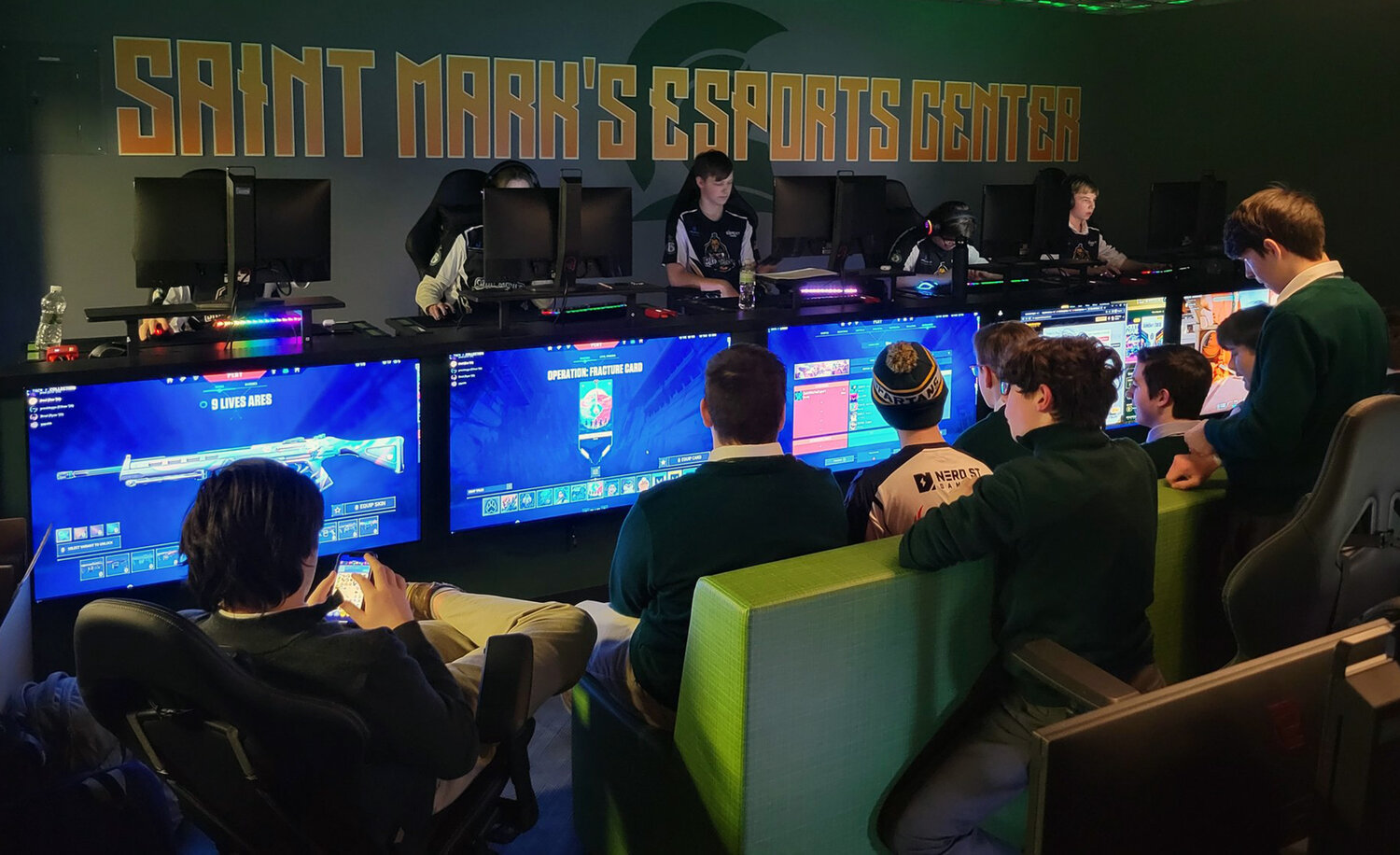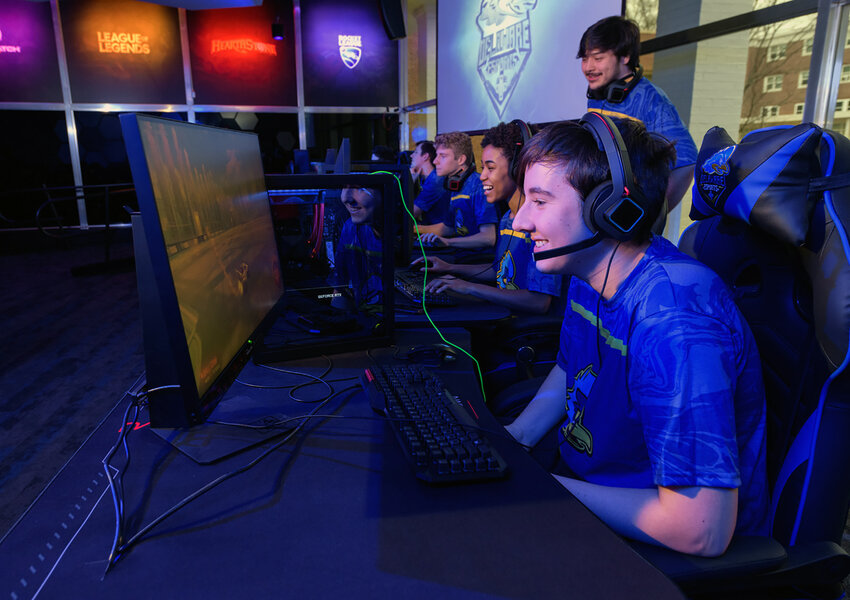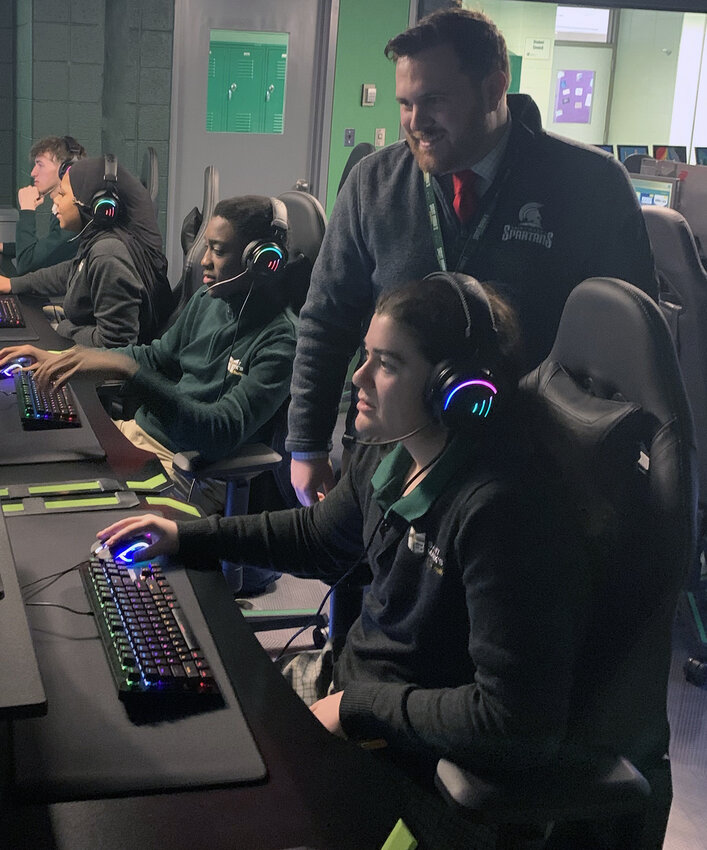Esports are becoming part of Delaware’s schools
DOVER — There’s always going to be people that think the name is kind of funny.
After all, the game players in esports aren’t doing any running or jumping while they’re …

You must be a member to read this story.
Join our family of readers for as little as $5 per month and support local, unbiased journalism.
Already a member? Log in to continue. Otherwise, follow the link below to join.
Please log in to continue |
Esports are becoming part of Delaware’s schools
DOVER — There’s always going to be people that think the name is kind of funny.
After all, the game players in esports aren’t doing any running or jumping while they’re competing.
As a former Delaware football standout, Dorrell Green’s background is in traditional sports.
But now, as the superintendent of the Red Clay School District, Dr. Green says there’s been an increasing overlap between the old-school and virtual sports worlds.
“Actually, if you look at a lot of our professional sports — in terms of skill development — a lot of it is through gaming and simulation,” said Dr. Green.
“Whether that’s NASCAR drivers using the actual game or simulator to learn certain tracks or, with AI technology, quarterbacks being able to put glasses on and really looking at how to read defenses.
“In my time at UD, we had a sports psychologist actually take us through visualization. Now it’s not just visualizing it in my own mind but actually visualizing and looking at game simulation using technology as an advantage.”
Whatever it’s called — and whatever traditionalists think of it — esports are becoming an increasingly bigger part of the competitive world in high schools and colleges.
Both Delaware and Delaware State have created gaming centers on campus and are offering partial esports scholarships.
And with high school leagues spreading across the country, the Delaware Interscholastic Athletic Association has started taking a closer look at esports. DIAA executive director Dave Baylor said some states have begun holding official state championships in it.
“It’s going to be something different than a traditional sport landscape than what we have been used to,” said Baylor. “But, by the same token, it allows student-athletes of a different type to compete against each other and to win a championship and represent their school.
“My position has always been, the more we can engage students to be involved in competition sports, that teaches life lessons and it give the kids an opportunity to do something other than hang out on the streets and get in trouble, I think it’s something worth pursuing.”
Saint Mark’s High has one of the most serious esports center in the state among high schools.
The Spartans have six teams, a roster with over 30 members and compete in national high school leagues. The team manager, Chris Ruffini, is going to teach three classes in subjects associated with gaming next year.
“There’s definitely a humongous interest in it,” said Ruffini. “Delaware is such a small state but it’s starting to get there.
“In all the states around us, it’s getting so big. Pennsylvania has its own league but in Delaware we’re still sort of waiting.
“It’s not an ‘if,’ it’s more of a ‘when.’ It’s going to be growing so much.”
More than just a game
Dr. Green remembers when it hit him just how big the gaming world is.
He saw his son watching replays of high-level gamers playing games.
“I started to see a lot of people immersed in that world,” he said. ‘It’s like, ‘Oh man, a light bulb moment.’
“Here’s a chance to look at game design, game development, sports management. ... there’s a whole industry that I think parents may not have been aware of.”
The idea, says esports proponents, is not only to allow more students to have positive experiences in school and with their classmates but to get them started on career paths.
Along with gaming itself, of course, there’s a world of careers associated specifically with computers.
“There’s a whole host of industries that support gaming ... and then looking at extensions to other pathways,” said Dr. Green. “They will lend themselves to a demographic of students that are immersed in that world to begin with but then also providing other opportunities.”
Red Clay’s A.I. duPont High is thought to be the first public high school in the state with a dedicated esports lab.
There are several other New Castle County schools with teams or clubs. Caesar Rodney has had an esports club in the past but didn’t have a teacher available to oversee the team this school year.
Saint Mark’s started its esports program three years ago.
“When schools bring esports to their school, they also bring curriculum,” said Ruffini. “To get them (the students) to do something fun, that they enjoy and actually learning how a computer works and all that ... computers aren’t going anywhere soon, technology’s not going anywhere. ... so seeing them involved with that is great.”
If being good at esports also builds a student’s self-esteem, that’s a good thing, too, said Ruffini.
“Not everyone is an athlete,” he said. “Not everyone can kick a ball, not everyone can throw a ball.
“Esports kind of gives a different group of kids a chance to compete. That’s what the best part about esports is. It’s not about the gaming ... it teaches these students skills in practicing, hard work and team work.
Is there a downside to gaming?
It’s no secret that video gaming can be addictive.
Studies have shown that it can lead to changes in the brain along the same lines as what occurs with gamblers and drug addicts.
Ruffini knows parents have concerns when it comes to their children playing too much.
“Parents always say that to me,” said Ruffini. “‘What if they just play games all day?’ But anything you do a lot of is not good. Life is all about balance.”
Ruffini said being part of an organized team actually helps players set limits to how long they spend on their computers. He also said college teams have physical workouts for their esports players as part of their schedule.
“I know this sounds crazy but it actually takes a lot stamina and a healthy body to sit at a game for a long period of time,” said Ruffini.
“There’s a difference between a college kid who doesn’t want to go to class and is just playing games and a kid who’s actually sitting down with a team strategizing for their next match.”
The DIAA’s Baylor said you can compare it to traditional sports.
“How much time is spent practicing a sport, how much time is spent on these AAU teams?” he said. “I could say the same thing about the kid who’s running all over the country for basketball or soccer or field hockey.
“Yes, I think there has to be monitoring as there has to be monitoring in anything that kids do.”
Athletes or not
As esports become more popular, they will no doubt spark more debate.
Of course, there will always be people who don’t believe video gamers should be called ‘athletes’ or what they do called a ‘game.’
All that Baylor knows is watching esports players compete is pretty impressive.
“I’ve been to a couple labs and I’ve seen what these kids do,” he said. “Man, it’s interesting.”
Ruffini said he has a running dialog with his team members about some of the terminology of esports.
At the end of the day, it depends on your definition of a sport and an athlete.
“It is it’s own thing,” said Ruffini. “You can’t treat it like a traditional sport.
“I always have this debate with my students. They’re like, ‘I want to be called an athlete.’ But I’m like, ‘That’d be nice, but we are different.’ It’s a whole different vibe.
“I’m not fighting for the word ‘athlete.’ But I just want these kids to have the chance to compete.”


 By
By 






